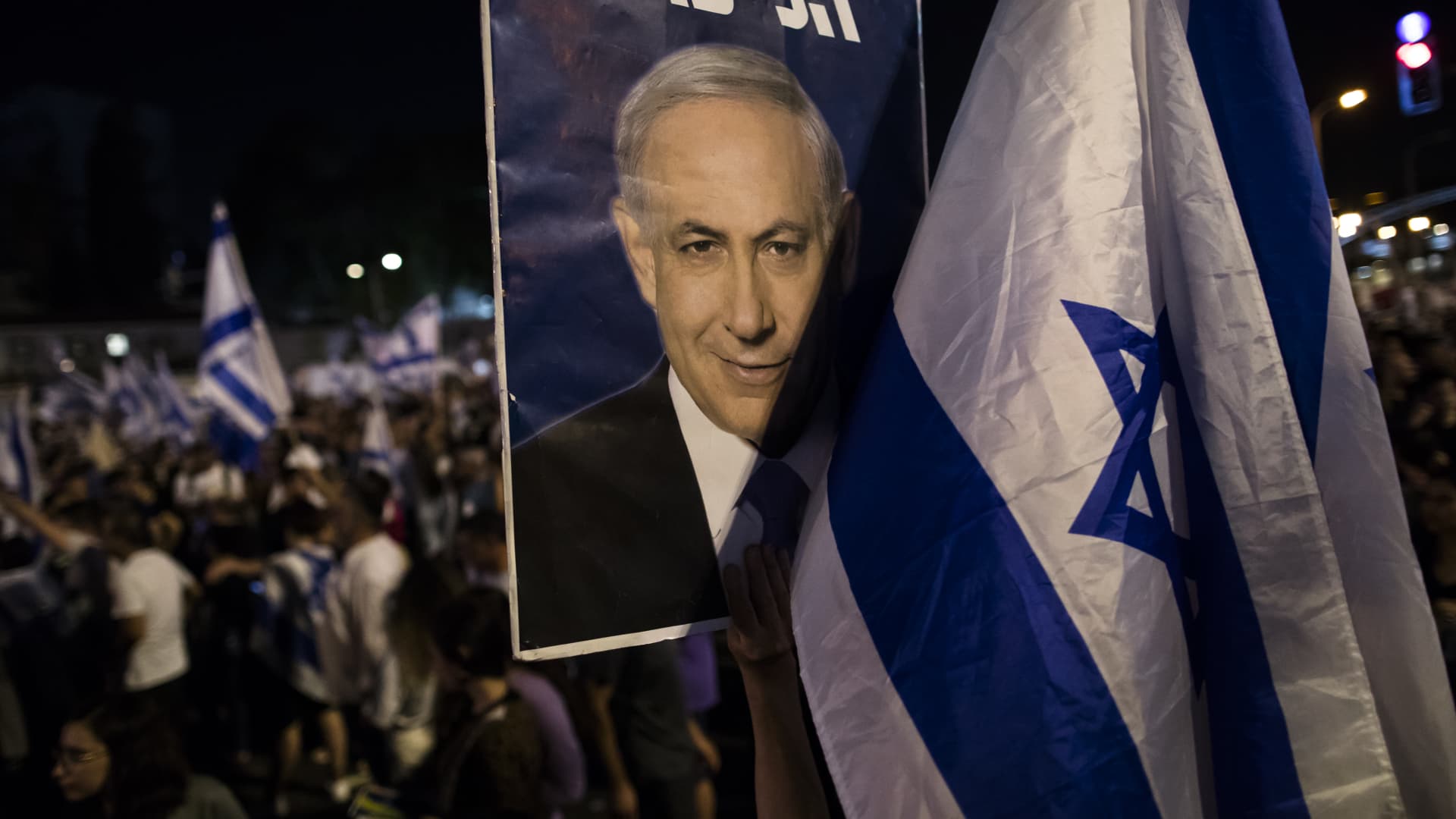A lady holds a placard with a photograph of Israeli Prime Minister Binyamin Netanyahu as the precise wing holds a rally to assist the federal government’s judicial overhaul on July 23, 2023 in Tel Aviv, Israel.
Amir Levy | Getty Photographs Information | Getty Photographs
Israeli Prime Minister Benjamin Netanyahu dismissed the opportunity of civil warfare in his nation, which has just lately been rattled by protracted mass protests over judicial reforms.
“There will not be civil warfare. I assure you that,” Netanyahu mentioned in a NBC Information interview aired Monday, in a bid to alleviate issues that Israel’s civil and social disaster might escalate to substantiate the March warning of Israeli President Isaac Herzog.
On the coronary heart of the battle is a judiciary modification, handed into legislation by a closing vote of 64-0 in Israel’s Parliament final week, that limits the unelected Supreme Courtroom’s potential to overrule governmental selections it deems unreasonable. Opponents of the laws argue that it substantively weakens the purview of Israel’s high authorized courtroom and paves the trail for abuses of energy and improper appointments. Elevating the stakes of the judicial adjustments, Israel lacks a formalized written structure and as a substitute is determined by a set of fundamental legal guidelines.
“I believe that correcting the imbalance in Israel’s democracy the place the judiciary has principally arrogated to itself practically all of the powers of the manager department and the legislator, I believe sure, it is very important do it,” Netanyahu confused. “I believe when the mud settles, folks will see Israel’s democracy has strengthened and never weakened, and I believe folks’s fears which were stoked and whipped up, I believe they’re going to subside and so they’ll see that Israel is simply as democratic because it was earlier than, and much more democratic.”
The prime minister dismissed criticism that the laws was doubtlessly rushed in, saying he continues to hunt compromise.
Mass demonstrations have erupted for months in key cities Tel Aviv and Jerusalem, leading to police clashes and quite a few arrests. A whole lot of Israeli reservists joined the protests and final month pledged to refuse their volunteer service if the judiciary overhaul pushes ahead, Reuters reported.
“I believe it is unlucky that you’ve got had reservists being lined up for one thing that entails a political debate,” Netanyahu commented. “In America, I believe the reservists account for about 1% of the inhabitants. In Israel, about half our folks … within the military. You’ll be able to at all times get, mobilize a number of thousand folks for this, or [for] that argument.”
The U.S., a significant ally, has expressed concern over the late-July vote.
“It’s unlucky that the vote at the moment befell with the slimmest attainable majority,” White Home Press Secretary Karine Jean-Pierre mentioned in a July 24 assertion. “We perceive talks are ongoing and more likely to proceed over the approaching weeks and months to forge a broader compromise even with the Knesset in recess.”
Addressing this place, Netanyahu mentioned that the Israeli-U.S. relationship “has its ups and downs,” however that the alliance “has by no means been stronger.”
“[The U.S.] President thought that we must always have tried to realize this, these reforms by consensus. I occurred to agreed with him. I’ve tried, and I am nonetheless attempting. However I believe in the end it is a resolution that’s … made as in any sovereign democracy by the … by the elected officers of Israel and that is what we’re doing,” Netanyahu mentioned.
Washington has been a crucial mediator in talks to clinch a so-far elusive normalization of relations between Israel and one of many Center East’s strongest economies, Saudi Arabia. The Riyadh monarchy has not acknowledged Israel since its 1948 institution out of assist for the Palestinian trigger and the international locations have remained staunchly unaligned even after they pursued a mutual agenda of guaranteeing Iran didn’t develop out nuclear capabilities. Saudi Arabia resumed diplomatic relations with Tehran this March, however has but to make overtures towards an keen Israel.
The Saudi facet has however confirmed indicators of potential, conditional thawing, after 4 Arab international locations — together with key Saudi ally the United Arab Emirates — agreed to kindle ties with Israel in 2020.
“Normalization, I’ve mentioned earlier than and it is fairly clear that we consider that normalization is within the curiosity of the area, that it could convey vital advantages to all. However with out discovering a pathway to peace for the Palestinian folks, with out addressing that problem, any normalization may have restricted advantages,” Saudi International Minister Prince Faisal bin Farhan al-Saud mentioned on June 8 in a joint press convention with U.S. Secretary of State Antony Blinken.
Netanyahu emphasised to NBC Information on Monday that normalizing relations with Saudi Arabia would mark a “pivot of historical past” and a “quantum leap after the quantum leap we already made with the Abraham Accords.” He refused to reveal the specifics of any potential negotiations with Riyadh.

